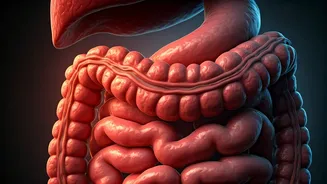Decoding Inflammation's Signals
Gut inflammation presents itself through a variety of telltale signs, often indicating underlying distress within the digestive system. A common symptom
is bloating, characterized by a feeling of fullness and abdominal discomfort. This can be accompanied by persistent fatigue, leaving individuals feeling drained and lacking energy. Furthermore, the skin may reflect the issue, with conditions like acne and rosacea becoming more prevalent. These skin manifestations serve as visible indicators of the inflammatory processes occurring within the body. Also, a weakened immune system is frequently observed as inflammation compromises the body's ability to defend against illness, making individuals more susceptible to infections and other health complications. Recognizing these diverse signs is the first step toward addressing and managing the underlying gut inflammation.
Consequences of Gut Trouble
The ramifications of gut inflammation extend far beyond mere discomfort, impacting overall health and well-being. A compromised gut can disrupt the delicate balance of the immune system, leaving individuals vulnerable to a range of health issues. When the gut is inflamed, it struggles to efficiently absorb nutrients, leading to deficiencies that further weaken the body's defenses. Furthermore, chronic inflammation in the gut has been linked to various systemic problems, including an increased risk of chronic diseases. Skin conditions, such as acne and rosacea, can become more severe. Therefore, understanding the broader consequences of gut inflammation underscores the importance of early detection and effective management strategies to safeguard long-term health.
Seeking Medical Guidance
When suspecting gut inflammation, seeking advice from a medical professional is crucial for accurate diagnosis and personalized treatment. A healthcare provider can conduct thorough evaluations, which may involve blood tests, stool analysis, or imaging scans to pinpoint the specific causes of inflammation. These diagnostic measures are essential for differentiating between various conditions and ruling out other potential health issues. Furthermore, healthcare professionals can offer tailored treatment plans based on individual needs and health histories. This might involve recommending specific dietary adjustments, prescribing medications, or suggesting lifestyle modifications to reduce inflammation and promote gut healing. Timely medical intervention plays a vital role in effectively managing gut inflammation and preventing its potential complications.
Dietary Strategies for Relief
Dietary changes can play a significant role in preventing and managing gut inflammation. Incorporating probiotics, beneficial bacteria that promote gut health, is a key strategy. Probiotics can be found in fermented foods or taken as supplements to help restore the balance of gut flora. Additionally, increasing fiber-rich foods in the diet can have a positive effect. Fiber, found in fruits, vegetables, and whole grains, supports healthy digestion and helps to reduce inflammation. It is important to emphasize that each individual's needs vary. Therefore, working with a healthcare provider or a registered dietitian to develop a customized dietary plan, considering individual tolerances and specific health requirements, is always advised. Prioritizing these dietary strategies contributes to improved gut health and overall well-being.




















